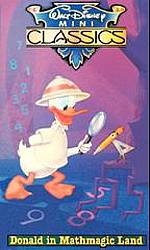Donald in Mathmagic Land
| Donald in Mathmagic Land | |
|---|---|

Walt Disney Mini Classics VHS cover
|
|
| Directed by |
Hamilton Luske (supervising) Wolfgang Reitherman Les Clark Joshua Meador (sequences) |
| Produced by | Walt Disney |
| Written by |
Milt Banta Bill Berg Heinz Haber |
| Starring |
Clarence Nash Paul Frees |
| Narrated by | Paul Frees |
| Music by | Buddy Baker |
| Cinematography | Edward Colman |
| Edited by | Lloyd L. Richardson |
| Distributed by | Buena Vista Film Distribution Company |
|
Release date
|
|
|
Running time
|
27 minutes |
| Country | United States |
| Language | English |
Donald in Mathmagic Land is a 27-minute Donald Duck educational featurette released on June 26, 1959. It was directed by Hamilton Luske. Contributors included Disney artists John Hench and Art Riley, voice talent Paul Frees, and scientific expert Heinz Haber, who had worked on the Disney space shows. It was released on a bill with Darby O'Gill and the Little People. In 1959, it was nominated for an Academy Award (Best Documentary - Short Subjects). In 1961, two years after its release, it was shown as part of the first program of Walt Disney's Wonderful World of Color with an introduction by Ludwig Von Drake. The film was made available to schools and became one of the most popular educational films ever made by Disney. As Walt Disney explained, "The cartoon is a good medium to stimulate interest. We have recently explained mathematics in a film and in that way excited public interest in this very important subject."
Donald Duck, holding a hunting rifle, passes through a doorway to find that he has entered Mathmagic Land. This "mighty strange" fantasy land contains trees with square roots, a stream flowing with numbers, and a walking pencil that plays tic-tac-toe. A geometric bird recites (almost perfectly) the first 15 digits of pi. Donald soon hears the voice of the "True Spirit of Adventure" (Paul Frees), who will guide him on his journey through "the wonderland of mathematics".
Donald is initially not interested in Mathmagic Land, believing that math is for "eggheads". When "Mr. Spirit" suggests a connection between math and music, though, Donald is intrigued. First, Donald discovers the relationships between octaves and string length which develop the musical scale of today. Next, Donald finds himself in ancient Greece, where Pythagoras and his contemporaries are discovering these same relationships. Pythagoras (on the harp), a flute player, and a double bass player hold a "jam session" which Donald joins after a few moments using a vase as a bongo drum. Pythagoras' music is, as the Spirit explains, the basis of today's music, and that music would not exist without "eggheads". The segment ends with a sequence of live action musicians playing both jazz and classical music and Pythagoras' pals fading away.
...
Wikipedia
